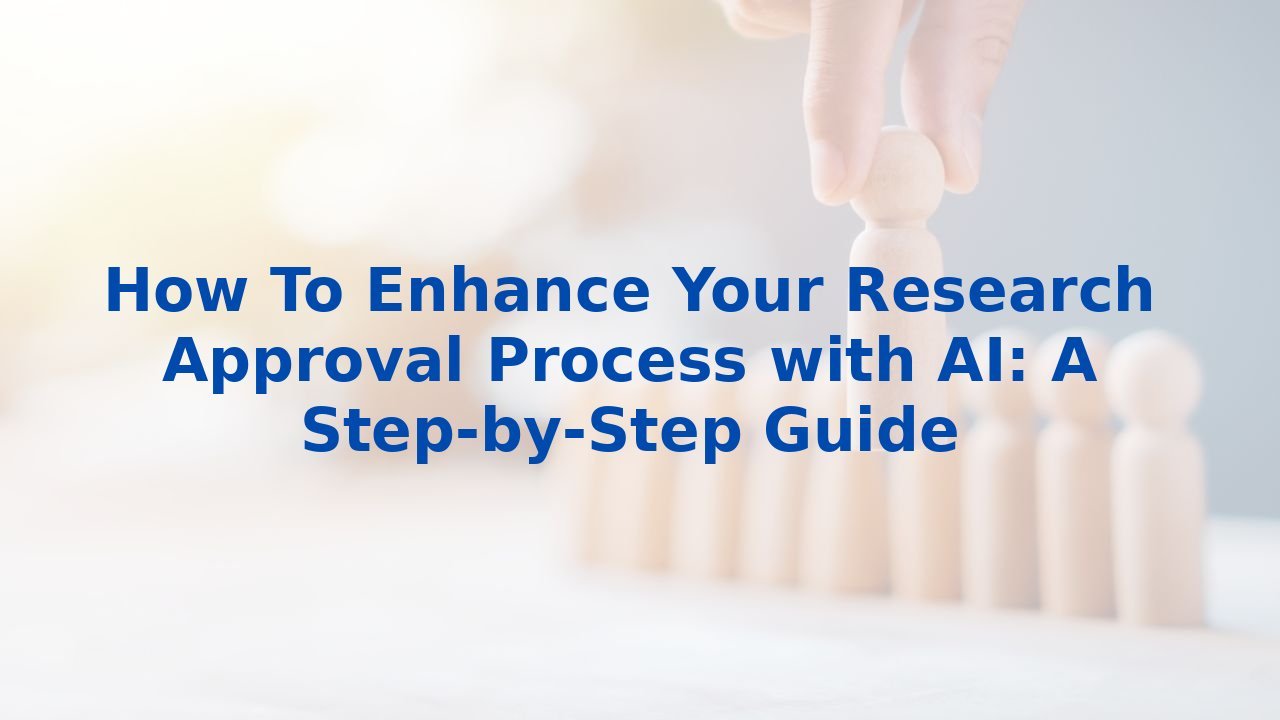How To Enhance Your Research Approval Process with AI: A Step-by-Step Guide
Enhancing Business Processes Through AI: A New Dawn in Research Approvals
In today’s fast-paced business landscape, the continuous drive for efficiency is paramount. One area that is ripe for improvement is the research approval process—a vital component in many organizations, particularly in the health research sector.
Understanding the Research Approval Process
The research approval process is a structured sequence of steps that organizations follow to evaluate and endorse research proposals. This process typically involves various stakeholders such as researchers, ethical review boards, and funding bodies. Each stage demands careful consideration and thorough documentation, ensuring that the proposed research adheres to ethical guidelines and aligns with organizational goals.
However, as organizations grow and research proposals multiply, the complexity of this process can lead to bottlenecks, miscommunication, and delays. This is where artificial intelligence comes into play, transforming traditional methodologies into streamlined, efficient operations.
Integrating AI: The Game Changer
Artificial intelligence offers a wealth of opportunities to enhance the research approval process significantly. Here are several ways AI can be a transformative force:
1. Streamlining Documentation:
AI can automate the generation and management of documentation, ensuring that all necessary forms are completed correctly and promptly. Natural language processing (NLP) tools can help analyze proposals, pinpointing key elements and even suggesting revisions to enhance clarity and compliance.
2. Accelerating Reviews:
AI systems can rapidly assess research proposals against predefined criteria. By using algorithms that incorporate past review outcomes, AI can generate preliminary assessments, allowing human reviewers to focus their expertise on more complex decision-making.
3. Enhancing Collaboration:
AI-powered platforms enable seamless communication among stakeholders, reducing the chances of miscommunication. These tools can facilitate real-time discussions, provide updates on proposal status, and share important documents, fostering a collaborative atmosphere.
4. Predictive Analytics:
By analyzing historical data, AI can offer insights into the approval process's duration and common pitfalls, empowering organizations to refine their methodologies continually. This predictive capability can help allocate resources more effectively, ensuring that staff are adequately prepared during peak periods of proposal submissions.
The Ripple Effect: Benefits of AI in Research Approvals
Integrating AI into the research approval process not only drives efficiency but also delivers numerous advantages:
1. Time Savings:
Automated processes significantly reduce the time required for document preparation, review, and approval, allowing researchers to dedicate more time to their core activities—conducting research and producing results.
2. Improved Quality:
With AI handling repetitive tasks, human reviewers can focus on quality assurance, resulting in more thorough evaluations and consequently higher-quality research outcomes.
3. Enhanced Compliance:
AI can help organizations ensure adherence to ethical guidelines and regulatory requirements by flagging potential compliance issues before they arise, thereby reducing the risk of costly errors.
Training Employees for an AI-Driven Future
While the integration of AI can revolutionize many processes, it’s equally critical to equip employees with the necessary skills to thrive in this new environment. Training programs focused on AI applications in research and related fields can empower teams.
1. Bridging Knowledge Gaps:
AI training initiatives ensure that employees are well-versed in how AI technologies can be leveraged. This not only enhances their capabilities but also boosts their confidence in using these systems.
2. Fostering Innovation:
When employees understand the potential of AI, they are more likely to contribute ideas on how AI can further streamline operations, fostering a culture of innovation within the organization.
3. Promoting Adaptability:
As AI technology evolves, an ongoing commitment to training helps organizations remain agile and responsive, ensuring that teams are consistently prepared to embrace new advancements.
Conclusion
The completion of the process mapping in research approval processes signifies a crucial step toward embracing AI's transformative powers. As organizations understand and harness these technologies, they not only enhance efficiency but also position themselves for greater successes in their missions. By investing in employees’ AI education, businesses can cultivate a workforce ready to navigate the future’s exciting but challenging landscape, ultimately driving innovation and creating breakthrough research outcomes.
For organizations looking to embark on this transformative journey, investing in comprehensive AI training programs might be the ticket to unlocking unparalleled efficiency and effectiveness in their operations. Explore opportunities for equipping your team with essential AI skills today.



